Actor and opera singer Beniamino Gigli (1890-1957) was one of the most famous Italian tenors, internationally respected for his beautiful voice and vocal technique. Between 1935 and 1950, 'Benito Mussolini's favourite singer' starred in various German and Italian entertainment films.
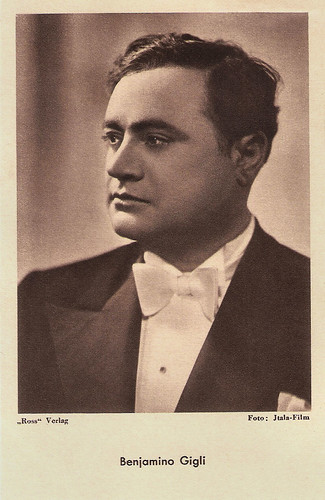
German postcard by Das Programm von Heute / Ross Verlag, Berlin. Photo: Itala-Film.
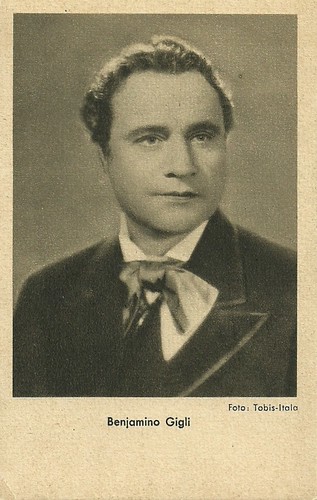
German postcard. Photo: Tobis / Itala.
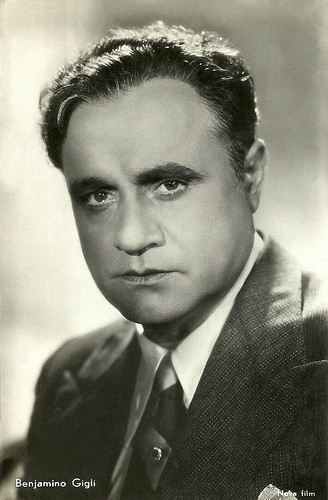
Italian postcard. Photo: Novo Film.
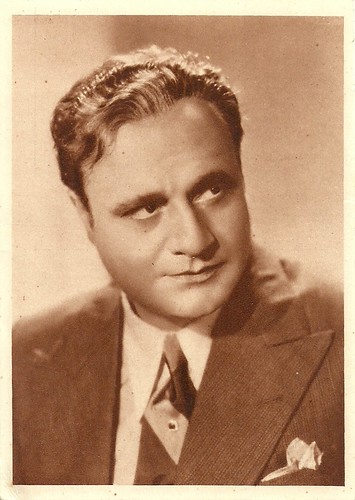
Italian postcard by Grafiche N. Moneta, Milano. Photo: Itala Film. Publicity still for Solo per te/Only for Thee (Carmine Gallone, 1937). Promotion for the film starting from Thursday 28... at the Cinema Corso.
Beniamino Gigli (also written as Benjamino Gigli) was born in 1890 in Recanati, near Ancona, as the son of an opera-loving shoemaker. His brother Lorenzo became a famous Italian painter. In 1914 Beniamino won his first award in an international singing contest in Parma. Later that year he made his début at the opera of Rovigo as Enzo in Amilcare Ponchielli's La Gioconda.
Soon his star rose, thanks to his part in Mefistofele by Arrigo Boito, which he performed in Palermo (1915), Naples (1915), Rome (1916), at La Scala in Milan under the direction of Arturo Toscanini (1918) and finally at the Metropolitan Opera in New York (1920). After the death of the famous opera tenor Enrico Caruso in 1921, Gigli became even more famous. He appeared as Edgardo in Donizetti's Lucia di Lammermoor, Rodolfo in Giacomo Puccini's La Bohème and in the title role of Umberto Giordano's Andrea Chénier, both of which he would later record in full. He was often nicknamed 'Caruso Secondo', though his voice was much sweeter than the dark, heroic voice of Caruso. At the Met, Gigli got competition from Giovanni Martinelli and Giacomo Lauri-Volpi.
After 12 years, Gigli left the Met in 1932, ostensibly after refusing to take a pay cut. He returned to Italy, and sang in houses there, elsewhere in Europe, and South America. In 1935, he started to perform in the cinema although he was - and would never become - a good actor and he was not in his prime any more either. Still, his films were cherished by European audiences. The storylines of his films often doubled the plots of the operas in which Gigli's character sang in real life as well. Gigli made many records, of his opera songs and the popular songs he sang in his films.
Gigli's first film was Non ti scordar di me!/Vergiss mein nicht/Forget Me Not (1935), directed by Augusto Genina in a Berlin studio. In the film, the female lead was played by Magda Schneider and the script was written by her husband Ernst Marischka. Because of Gigli's heavy accent, Genina had provided a script about an Italian opera singer who meets a young German teacher (Schneider) who is still troubled over a lost romance and is struck when Gigli starts to sing Non ti scordar di me. The song was specially written for the film by Ernesto De Curtis. Genina was worried about Gigli's rotund physique, regarded as unfit to represent a romantic lover, but when the film came out women adored him.
So several follow-ups to Non ti scordar di me followed. First, there was Forget Me Not (1936), a British version of the same film, in which Schneider's part was played by Joan Gardner and the script was written by Hugh Gray and Arthur Wimperis. After the war, Gigli started his opera performances again. He even did a big tour in the early 1950s. His health deteriorated and he had to stop, first with the operas and later with his solo performances.
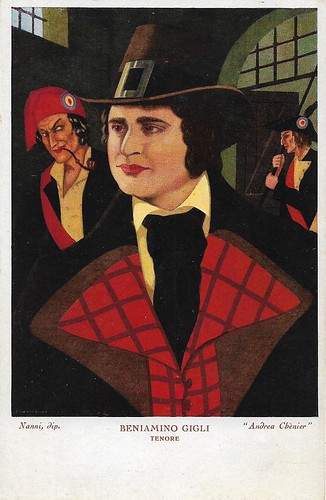
Italian postcard by La Voce del Padrone, S.A. Nazionale del Grammofono, Milano. Artwork: Nanni. Beniamino Gigli as the title character in the Italian opera 'Andrea Chénier' (1896) by Umberto Giordano, libretto by Luigi Illica.
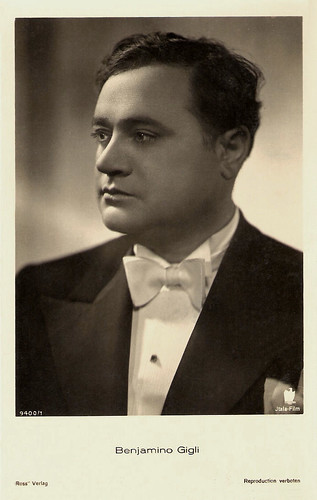
German postcard by Ross Verlag, no. 9400/1, 1935-1936. Photo: Itala Film.
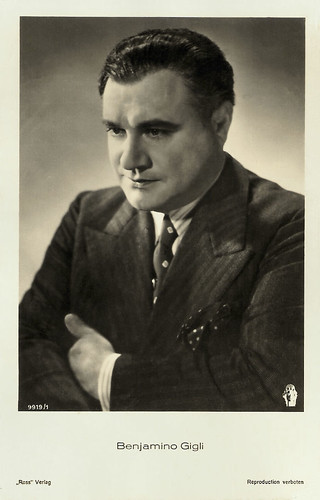
German postcard by Ross Verlag, no. 9919/1, 1935-1936. Photo: Itala-Film.

German postcard by Ross Verlag, no. A 1530/1, 1937-1938. Photo: Itala-Film.
Beniamino Gigli played and sang in a series of entertainment films shot in Germany. They were directed by former Weimar cinema actor Johannes Riemann and the former theatre innovator Karlheinz Martin. In Ave Maria (Johannes Riemann, 1936), Käthe von Nägy played a golddigger who falls for the tenor's wealth, but in the end, falls for himself. In Du bist mein Glück/Thou Art My Joy (Karlheinz Martin, 1936), Isa Miranda appeared in a double role and the film was partly shot in Genoa, Liguria. Gigli co-starred in Die Stimme des Herzens/The Voice of the Heart (Karlheinz Martin, 1937) with Geraldine Katt and Ferdinand Marian.
Gigli then returned to Rome to play in films shot at the Cinecittà studios, first the multilingual Solo per te/Mutter lied/Only for Thee (Carmine Gallone, 1937), co-starring Maria Cebotari as the singer's unfaithful wife and young Peter Bosse as their son. Bosse had already played the singer's son in Vergiss mein nicht/Forget Me Not (Augusto Genina, 1935). After a small part as a tenor in the historical film Giuseppe Verdi (Carmine Gallone, 1938) featuring Fosco Giachetti as the composer, Gigli starred again in Gallone's Dir gehört mein Herz/My Heart Belongs to Thee (Carmine Gallone, 1938), which had an almost exclusively German cast including Carla Rust, Lucie Englisch and Paul Kemp, but was again shot at Cinecittà. After a part in the German short Der Trichter Nr. II/The Funnel No II (1939), Gigli continued at Cinecittà with Der singende Tor/The Singing Gate (Johannes Meyer, 1939) with Norwegian star Kirsten Heiberg. It was also released in Italian as Casa lontana.
In 1940 Gigli played in the multilingual Ritorno/Traummusik/Return (Géza von Bolváry, 1940). It was followed by Mamma/Mother (Guido Brignone, 1941) in which Gigli sang the song which forever stuck to him: Mamma. In Vertigine/Tragödie einer Liebe/Broken Love (Guido Brignone, 1941) he appeared with Emma Grammatica and Camilla Horn. In 1943 Gigli gave his last film performances of the war years. First, he appeared in the multilingual I Pagliacci/Lache, Bajazzo/Laugh Pagliacci (Giuseppe Fatigati, Leopold Hainisch, 1943), with Paul Hörbiger and Dagny Servaes acting in both versions. The female lead was played by Alida Valli in the Italian version and by Claude Farell (Monika Burg) in the German version. The second film of 1943 was Silenzio, si gira!/Silence, Action! (Carlo Campogalliani, 1943) with Rossano Brazzi, which mingled opera and cinema world and in which Gigli had a double role as an opera singer and his stealing stand-in.
Gigli had been Benito Mussolini's favourite singer, for which he was criticised, but it was clear that he had never been a collaborator. So, in the postwar era, he could play without any problems in Voglio bene soltanto a te/I Only Care For You (Giuseppe Fatigati, 1946), and Una voce nel tuo cuore/A Voice in Your Heart (Alberto d'Alversa, 1949) which starred Vittorio Gassmann. He also appeared on the stage and the audience acclaim was bigger and more clamorous than ever. Gigli had his last film lead in Taxi di notte/Singing Taxi Driver (Carmine Gallone, 1950), a comedy about a singing taxi driver who finds a baby but not its mother.
Gigli's last performance was a small part in Puccini (Carmine Gallone, 1953), a biopic on the famous composer played by Gabriele Ferzetti. Gigli played an opera singer, of course. Before his retirement in 1955, Gigli undertook an exhausting world tour of Farewell Concerts. This impaired his health in the two years that remained to him, during which time he helped prepare his 'Memoirs' (based primarily on an earlier Memoir, fleshed out by a series of interviews). Beniamino Gigli died in Rome in 1957, because of a heart attack. Gigli lied in his 'Memoirs' of 1957, saying he was married six months earlier than he really was. This was to conceal that his wife Costanza was pregnant before reaching the altar. Gigli had two children with Costanza: Enzo Gigli and Rina Gigli, who was a well-known soprano in her own right. Later, Gigli had a second family with Lucia Vigarani, producing three children. Gigli is rumoured to have had at least three other children with as many different women. Gigli's exact number of offspring is unknown.
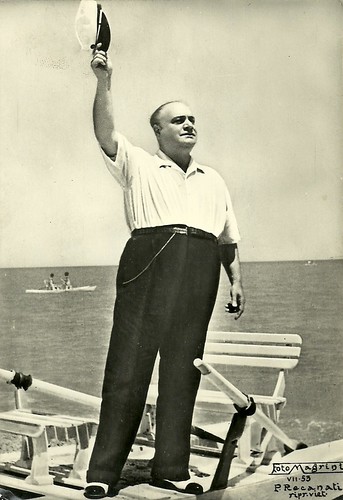
Italian postcard by Ed. Libreria Ottoboni, Recanati / Fototipia Berretto, Terni. Photo: Magrint. Gigli at Portorecanati, August 1953.
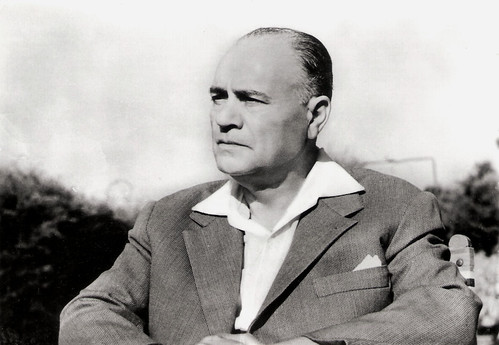
Italian postcard by Editrice Ottoboni, Recanati. Sent by mail in 1966. Photo: Stortoni.
Beniamino Gigli sings 'O sole mio' in Non ti scordar di me!/Vergiss mein nicht/Forget Me Not (1935). Source: Tenor65 (YouTube).
Beniamino Gigli sings 'Mamma'. Source: Kyoto Melody (YouTube).
Beniamino Gigli sings 'La giubba' from I pagliacci/Laugh Pagliacci (1947) while the heart broken Paul Hörbiger watches the stage. Source: Greek Callas (YouTube).
Sources: Stephanie D'heil (Steffi-line - German), gary170459 (IMDb), Filmportal.de, Wikipedia (Italian, English, German and Dutch), and IMDb.
This post was last updated on 19 May 2024.

German postcard by Das Programm von Heute / Ross Verlag, Berlin. Photo: Itala-Film.

German postcard. Photo: Tobis / Itala.

Italian postcard. Photo: Novo Film.

Italian postcard by Grafiche N. Moneta, Milano. Photo: Itala Film. Publicity still for Solo per te/Only for Thee (Carmine Gallone, 1937). Promotion for the film starting from Thursday 28... at the Cinema Corso.
Caruso secondo
Beniamino Gigli (also written as Benjamino Gigli) was born in 1890 in Recanati, near Ancona, as the son of an opera-loving shoemaker. His brother Lorenzo became a famous Italian painter. In 1914 Beniamino won his first award in an international singing contest in Parma. Later that year he made his début at the opera of Rovigo as Enzo in Amilcare Ponchielli's La Gioconda.
Soon his star rose, thanks to his part in Mefistofele by Arrigo Boito, which he performed in Palermo (1915), Naples (1915), Rome (1916), at La Scala in Milan under the direction of Arturo Toscanini (1918) and finally at the Metropolitan Opera in New York (1920). After the death of the famous opera tenor Enrico Caruso in 1921, Gigli became even more famous. He appeared as Edgardo in Donizetti's Lucia di Lammermoor, Rodolfo in Giacomo Puccini's La Bohème and in the title role of Umberto Giordano's Andrea Chénier, both of which he would later record in full. He was often nicknamed 'Caruso Secondo', though his voice was much sweeter than the dark, heroic voice of Caruso. At the Met, Gigli got competition from Giovanni Martinelli and Giacomo Lauri-Volpi.
After 12 years, Gigli left the Met in 1932, ostensibly after refusing to take a pay cut. He returned to Italy, and sang in houses there, elsewhere in Europe, and South America. In 1935, he started to perform in the cinema although he was - and would never become - a good actor and he was not in his prime any more either. Still, his films were cherished by European audiences. The storylines of his films often doubled the plots of the operas in which Gigli's character sang in real life as well. Gigli made many records, of his opera songs and the popular songs he sang in his films.
Gigli's first film was Non ti scordar di me!/Vergiss mein nicht/Forget Me Not (1935), directed by Augusto Genina in a Berlin studio. In the film, the female lead was played by Magda Schneider and the script was written by her husband Ernst Marischka. Because of Gigli's heavy accent, Genina had provided a script about an Italian opera singer who meets a young German teacher (Schneider) who is still troubled over a lost romance and is struck when Gigli starts to sing Non ti scordar di me. The song was specially written for the film by Ernesto De Curtis. Genina was worried about Gigli's rotund physique, regarded as unfit to represent a romantic lover, but when the film came out women adored him.
So several follow-ups to Non ti scordar di me followed. First, there was Forget Me Not (1936), a British version of the same film, in which Schneider's part was played by Joan Gardner and the script was written by Hugh Gray and Arthur Wimperis. After the war, Gigli started his opera performances again. He even did a big tour in the early 1950s. His health deteriorated and he had to stop, first with the operas and later with his solo performances.

Italian postcard by La Voce del Padrone, S.A. Nazionale del Grammofono, Milano. Artwork: Nanni. Beniamino Gigli as the title character in the Italian opera 'Andrea Chénier' (1896) by Umberto Giordano, libretto by Luigi Illica.

German postcard by Ross Verlag, no. 9400/1, 1935-1936. Photo: Itala Film.

German postcard by Ross Verlag, no. 9919/1, 1935-1936. Photo: Itala-Film.

German postcard by Ross Verlag, no. A 1530/1, 1937-1938. Photo: Itala-Film.
Cinecittà
Beniamino Gigli played and sang in a series of entertainment films shot in Germany. They were directed by former Weimar cinema actor Johannes Riemann and the former theatre innovator Karlheinz Martin. In Ave Maria (Johannes Riemann, 1936), Käthe von Nägy played a golddigger who falls for the tenor's wealth, but in the end, falls for himself. In Du bist mein Glück/Thou Art My Joy (Karlheinz Martin, 1936), Isa Miranda appeared in a double role and the film was partly shot in Genoa, Liguria. Gigli co-starred in Die Stimme des Herzens/The Voice of the Heart (Karlheinz Martin, 1937) with Geraldine Katt and Ferdinand Marian.
Gigli then returned to Rome to play in films shot at the Cinecittà studios, first the multilingual Solo per te/Mutter lied/Only for Thee (Carmine Gallone, 1937), co-starring Maria Cebotari as the singer's unfaithful wife and young Peter Bosse as their son. Bosse had already played the singer's son in Vergiss mein nicht/Forget Me Not (Augusto Genina, 1935). After a small part as a tenor in the historical film Giuseppe Verdi (Carmine Gallone, 1938) featuring Fosco Giachetti as the composer, Gigli starred again in Gallone's Dir gehört mein Herz/My Heart Belongs to Thee (Carmine Gallone, 1938), which had an almost exclusively German cast including Carla Rust, Lucie Englisch and Paul Kemp, but was again shot at Cinecittà. After a part in the German short Der Trichter Nr. II/The Funnel No II (1939), Gigli continued at Cinecittà with Der singende Tor/The Singing Gate (Johannes Meyer, 1939) with Norwegian star Kirsten Heiberg. It was also released in Italian as Casa lontana.
In 1940 Gigli played in the multilingual Ritorno/Traummusik/Return (Géza von Bolváry, 1940). It was followed by Mamma/Mother (Guido Brignone, 1941) in which Gigli sang the song which forever stuck to him: Mamma. In Vertigine/Tragödie einer Liebe/Broken Love (Guido Brignone, 1941) he appeared with Emma Grammatica and Camilla Horn. In 1943 Gigli gave his last film performances of the war years. First, he appeared in the multilingual I Pagliacci/Lache, Bajazzo/Laugh Pagliacci (Giuseppe Fatigati, Leopold Hainisch, 1943), with Paul Hörbiger and Dagny Servaes acting in both versions. The female lead was played by Alida Valli in the Italian version and by Claude Farell (Monika Burg) in the German version. The second film of 1943 was Silenzio, si gira!/Silence, Action! (Carlo Campogalliani, 1943) with Rossano Brazzi, which mingled opera and cinema world and in which Gigli had a double role as an opera singer and his stealing stand-in.
Gigli had been Benito Mussolini's favourite singer, for which he was criticised, but it was clear that he had never been a collaborator. So, in the postwar era, he could play without any problems in Voglio bene soltanto a te/I Only Care For You (Giuseppe Fatigati, 1946), and Una voce nel tuo cuore/A Voice in Your Heart (Alberto d'Alversa, 1949) which starred Vittorio Gassmann. He also appeared on the stage and the audience acclaim was bigger and more clamorous than ever. Gigli had his last film lead in Taxi di notte/Singing Taxi Driver (Carmine Gallone, 1950), a comedy about a singing taxi driver who finds a baby but not its mother.
Gigli's last performance was a small part in Puccini (Carmine Gallone, 1953), a biopic on the famous composer played by Gabriele Ferzetti. Gigli played an opera singer, of course. Before his retirement in 1955, Gigli undertook an exhausting world tour of Farewell Concerts. This impaired his health in the two years that remained to him, during which time he helped prepare his 'Memoirs' (based primarily on an earlier Memoir, fleshed out by a series of interviews). Beniamino Gigli died in Rome in 1957, because of a heart attack. Gigli lied in his 'Memoirs' of 1957, saying he was married six months earlier than he really was. This was to conceal that his wife Costanza was pregnant before reaching the altar. Gigli had two children with Costanza: Enzo Gigli and Rina Gigli, who was a well-known soprano in her own right. Later, Gigli had a second family with Lucia Vigarani, producing three children. Gigli is rumoured to have had at least three other children with as many different women. Gigli's exact number of offspring is unknown.

Italian postcard by Ed. Libreria Ottoboni, Recanati / Fototipia Berretto, Terni. Photo: Magrint. Gigli at Portorecanati, August 1953.

Italian postcard by Editrice Ottoboni, Recanati. Sent by mail in 1966. Photo: Stortoni.
Beniamino Gigli sings 'O sole mio' in Non ti scordar di me!/Vergiss mein nicht/Forget Me Not (1935). Source: Tenor65 (YouTube).
Beniamino Gigli sings 'Mamma'. Source: Kyoto Melody (YouTube).
Beniamino Gigli sings 'La giubba' from I pagliacci/Laugh Pagliacci (1947) while the heart broken Paul Hörbiger watches the stage. Source: Greek Callas (YouTube).
Sources: Stephanie D'heil (Steffi-line - German), gary170459 (IMDb), Filmportal.de, Wikipedia (Italian, English, German and Dutch), and IMDb.
This post was last updated on 19 May 2024.
Hello. My name is Ashot Arakelyan, I'm the owner of the blog - http://goldenageoperasingers.blogspot.com
ReplyDeleteI have a request to you - Can we exchange the links of our blog by adding in the link section?
All the best
Ashot
Hi Ashot, Thanks for your comment. Your suggestion to exchange links is a great idea. I've already added your URL to my list.
ReplyDelete